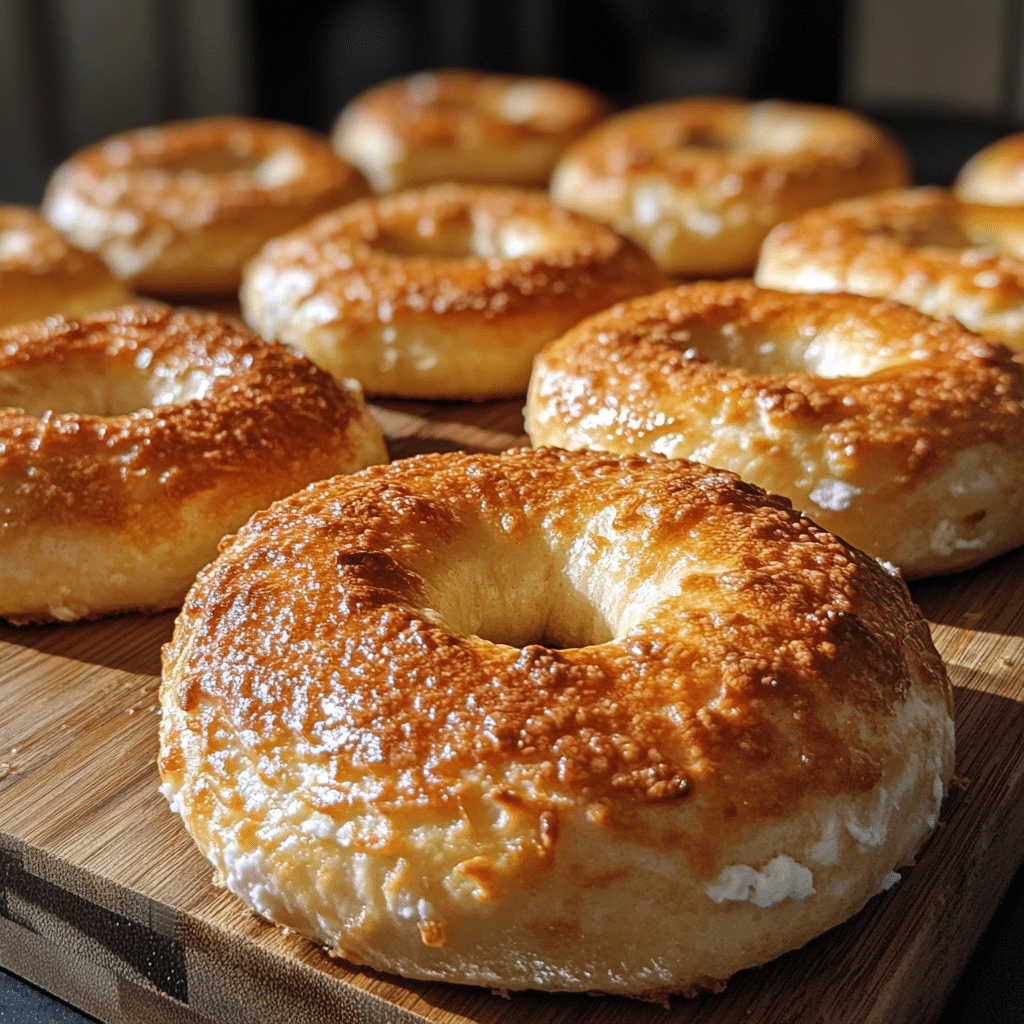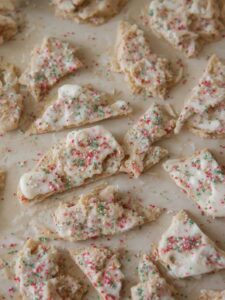Craving a soft, chewy bagel with fewer carbs and more protein? Look no further than cottage cheese bagels. These high-protein wonders are perfect for breakfast, lunch, or snacks, and they’re surprisingly easy to make at home. Whether you’re watching your calories, want a gluten-free option, or just love experimenting in the kitchen, this guide will walk you through every step.
We’ll cover everything from ingredients and gluten-free alternatives to baking tips and topping ideas. You’ll also find solutions to common baking problems and honest answers to popular questions like “Why is my dough sticky?” or “Do I need to blend the cottage cheese bagels?”
Don’t miss our Natural Zepbound Recipes for more health-focused creations like this.
Table of Contents
ToggleWhat Are Cottage Cheese Bagels?
Cottage Cheese Bagels
Cottage cheese bagels are a modern take on the classic bagel, using cottage cheese bagels in the dough to boost protein and moisture. They’re a favorite among home bakers, fitness enthusiasts, and anyone looking for a lighter, nutrient-rich alternative to traditional bagels.
Unlike store-bought bagels that often contain preservatives, refined sugar, and excess carbs, cottage cheese bagels focus on whole ingredients with fewer additives.
How They Differ from Traditional Bagels
The biggest differences lie in texture, preparation, and nutrition. Here’s a quick comparison:
| Feature | Traditional Bagels | Cottage Cheese Bagels |
|---|---|---|
| Main Fat Source | Oil or Butter | Cottage Cheese |
| Protein Content | Moderate | High |
| Dough Process | Yeast, Rising, Boiling | Quick Mix, Optional Boil |
| Calories (avg.) | 280–350 | 180–250 |
| Texture | Dense and Chewy | Soft and Moist |
The cottage cheese not only replaces other fats but also adds a creamy texture that results in a softer, more tender bite. It’s a fantastic substitute for cream cheese as a topping too.
Why Cottage Cheese Bagels is a Game-Changer
Cottage cheese bagels is high in casein protein, which digests slowly and helps keep you full longer. It’s also lower in fat and calories than cream cheese or butter, making it an ideal ingredient for weight-conscious eaters.
Some additional benefits:
- Supports muscle repair and metabolism
- Rich in calcium and phosphorus
- Helps balance the moisture in the dough
Check out Pink Salt Weight Loss Recipe if you’re focused on healthy, nutrient-packed meals just like these bagels.
Print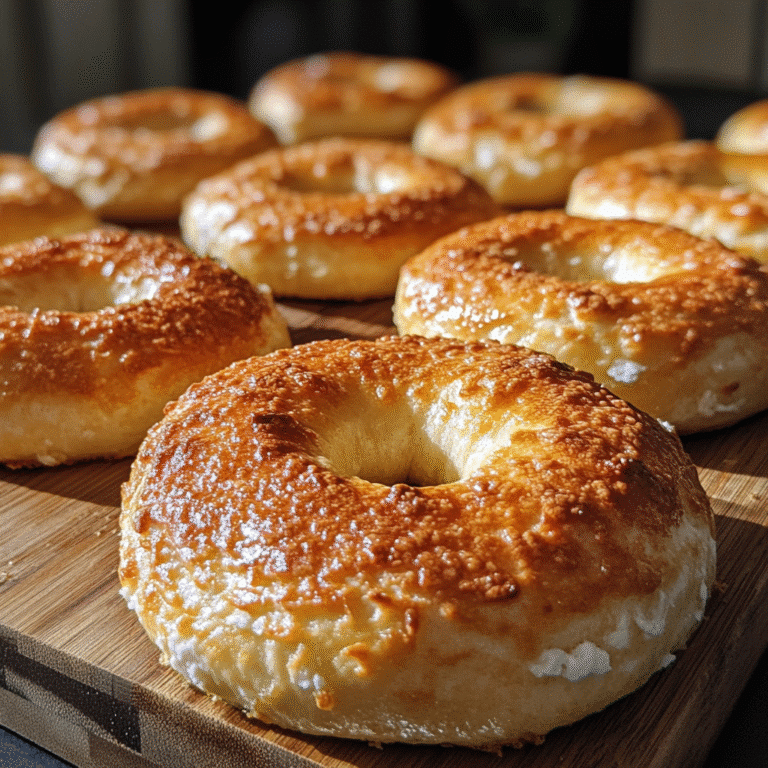
Cottage Cheese Bagels
5 Stars 4 Stars 3 Stars 2 Stars 1 Star
No reviews
High-protein, low-carb cottage cheese bagels that are soft, chewy, and easy to make—perfect for a healthy breakfast or snack.
- Total Time: 35 minutes
- Yield: 4 bagels 1x
Ingredients
1 cup cottage cheese (blended or unblended)
1 cup self-rising flour (or 1 cup all-purpose + 1 ½ tsp baking powder + ½ tsp salt)
1/4 cup Greek yogurt (optional)
1 egg (for egg wash, optional)
Everything seasoning, sesame seeds, or cinnamon (for topping, optional)
Instructions
1. Preheat oven to 375°F (190°C) and line a baking sheet with parchment paper.
2. In a bowl, mix cottage cheese and Greek yogurt (if using) until combined.
3. Add the flour mixture and stir until a sticky dough forms.
4. Lightly flour your hands and knead the dough on a floured surface for 1–2 minutes until smooth.
5. Divide the dough into 4–6 equal parts and shape into bagels by poking a hole in the center.
6. Optional: Bring a pot of water to a boil, add 1 tbsp baking soda, and boil each bagel 30–60 seconds per side. Drain well.
7. Place shaped bagels on the baking sheet. Brush with egg wash or milk.
8. Sprinkle desired toppings on each bagel.
9. Bake for 20–25 minutes or until golden brown and firm.
10. Cool slightly and enjoy fresh, or store for later use.
Notes
For gluten-free bagels, substitute with a 1:1 gluten-free flour blend that contains xanthan gum.
Blending cottage cheese helps with a smoother dough but is not required.
Sweet variations include adding cinnamon, raisins, or blueberries.
Savory options include garlic herb, everything seasoning, or jalapeño cheddar.
To store, keep in an airtight container in the fridge for up to 4 days or freeze for 3 months.
- Author: Jessica Lupone!
- Prep Time: 10 minutes
- Cook Time: 25 minutes
- Category: Breakfast
- Method: Baking
- Cuisine: American
Nutrition
- Serving Size: 1 bagel
- Calories: 190
- Sugar: 2g
- Sodium: 300mg
- Fat: 5g
- Saturated Fat: 2g
- Unsaturated Fat: 2g
- Trans Fat: 0g
- Carbohydrates: 20g
- Fiber: 2g
- Protein: 14g
- Cholesterol: 30mg
Key Ingredients for the Perfect Cottage Cheese Bagels
The Role of Cottage Cheese Bagels in the Dough
Cottage cheese bagels is the hero of this recipe. Its creamy texture and mild tang add moisture, structure, and a protein punch to your bagels. When used correctly, it eliminates the need for excess oil or butter, keeping the recipe lighter and more balanced.
But here’s the trick—you don’t always have to blend the cottage cheese bagels, but doing so can help create a smoother dough and more uniform texture. For chunkier, rustic bagels, go ahead and leave it unblended. Prefer a cleaner finish? Give it a quick blitz in the blender or food processor before mixing it in.
Nutritional Note:
1/2 cup of low-fat cottage cheese bagels contains:
- 13g of protein
- Only 90 calories
- 2g of fat
- Calcium and B-vitamins
Cottage cheese bagels works both as a binding agent and a softener, which is why it’s gaining popularity in healthy baking.
Other Ingredients and Healthy Alternatives
Aside from cottage cheese, here’s a breakdown of other essential ingredients and options to suit different dietary needs:
| Ingredient | Purpose | Healthy Substitutes |
|---|---|---|
| All-purpose flour | Structure and volume | Oat flour, almond flour (GF option) |
| Baking powder | Helps the bagels rise | Gluten-free baking powder |
| Greek yogurt | Moisture and slight tang | Skyr, dairy-free coconut yogurt |
| Egg (optional) | For egg wash to add shine & color | Milk, oil spray, or aquafaba |
| Seasonings | Flavor (everything bagel, garlic) | Sesame, herbs, cinnamon, raisins |
Pro Tips for Ingredient Swaps:
- Gluten-free flour: Use a 1:1 gluten-free blend with xanthan gum for structure.
- Vegan twist: Sub Greek yogurt with coconut yogurt and skip the egg wash.
- Sweet version: Add a dash of honey, vanilla, and cinnamon into the dough.
Using the right ingredients ensures your bagels are not only healthy but also fluffy, flavorful, and satisfying.
Step-by-Step Guide to Making Cottage Cheese Bagels
Mixing and Preparing the Dough
Making cottage cheese bagels at home is surprisingly simple. You don’t need a mixer or advanced baking skills—just basic ingredients and 20–30 minutes of your time.
Here’s a basic base recipe to follow:
Basic Cottage Cheese Bagels Dough
- 1 cup cottage cheese (blended or unblended based on texture preference)
- 1 cup self-rising flour (or 1 cup all-purpose + 1 ½ tsp baking powder + ½ tsp salt)
- 1/4 cup Greek yogurt (optional for more moisture and tang)
- 1 egg (for egg wash, optional)
Instructions:
- Preheat your oven to 375°F (190°C).
- Mix the cottage cheese and Greek yogurt (if using) in a large bowl.
- Add the flour (and baking powder/salt if not using self-rising flour). Mix until a dough forms.
- The dough may be slightly sticky—this is normal. Lightly flour your hands and kneading surface.
- Knead gently for 1–2 minutes until the dough is smooth and elastic.
Pro Tip: If the dough feels overly sticky, don’t add too much flour at once. Just flour your hands, knead, and let the dough sit for 5 minutes before continuing. This allows the flour to absorb moisture naturally.
Shaping, Boiling, and Baking
Once your dough is ready, it’s time to shape your bagels. You can make traditional ring shapes or mini rounds for bagel bites.
Shaping Instructions:
- Divide dough into 4–6 equal parts.
- Roll each into a ball, then poke a hole in the center using your finger.
- Gently stretch into a ring without tearing.
Optional Boiling Step (for chewy texture):
- Heat a pot of water until it reaches a gentle boil.
- Add 1 tbsp of baking soda.
- Boil each bagel for 30–60 seconds per side.
- Drain and place on parchment-lined baking sheet.
Baking Instructions:
- Brush each bagel with egg wash (or milk for golden finish).
- Sprinkle toppings (everything seasoning, sesame seeds, cinnamon sugar, etc.)
- Bake at 375°F for 20–25 minutes until golden brown and firm to touch.
Looking for inspiration? Try Pink Salt Weight Loss Recipe if you’re seeking more nutrient-dense meal prep options.
These bagels come out soft and light on the inside with a beautiful golden crust. No rising, no yeast, and absolutely no hassle.
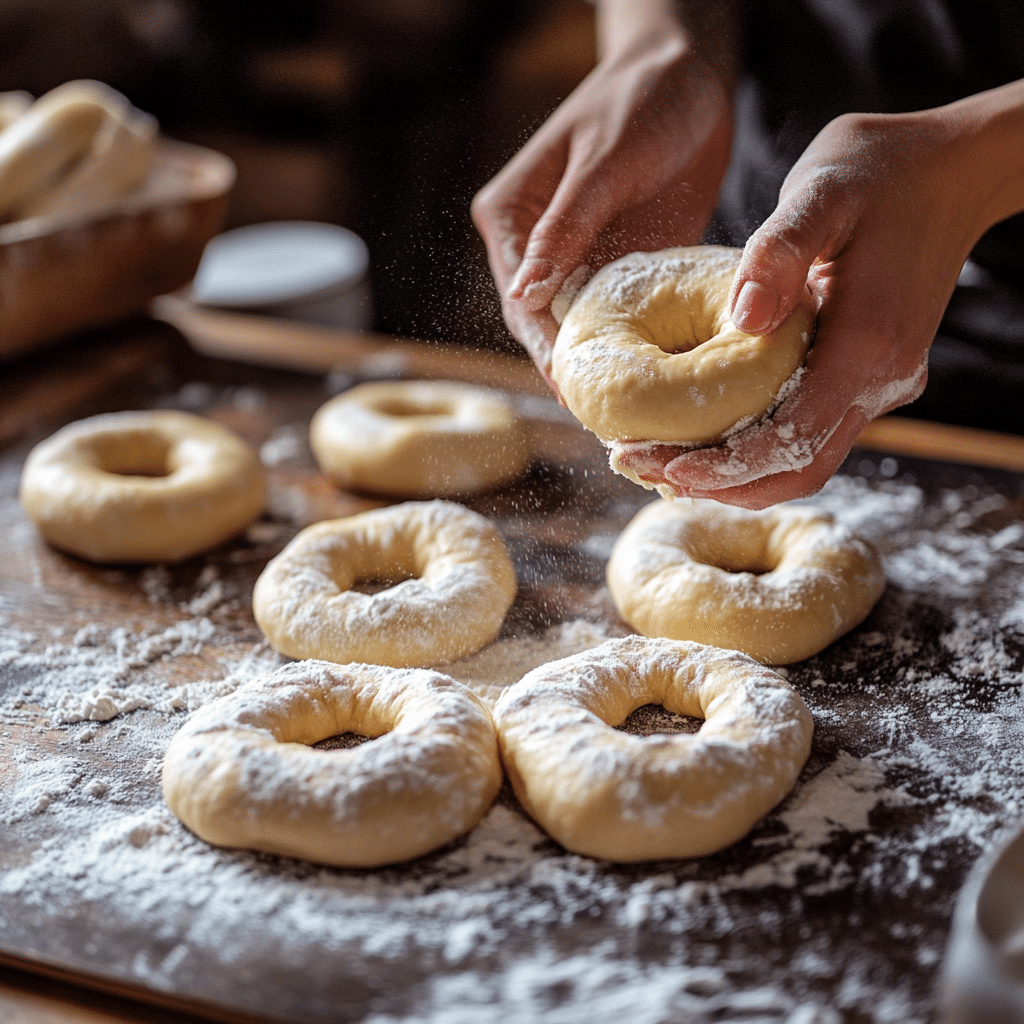
Gluten-Free Cottage Cheese Bagels
Can You Make Them Gluten-Free? (YES—Here’s How)
Absolutely—you can make delicious gluten-free cottage cheese bagels without sacrificing taste or texture. In fact, the moisture from the cottage cheese helps bind gluten-free flour better than in most standard recipes. This makes them an ideal candidate for anyone avoiding gluten due to allergies, celiac disease, or lifestyle choices.
Here’s what you’ll need to swap:
Gluten-Free Dough Base
- 1 cup cottage cheese (full-fat or low-fat, blended if possible)
- 1 cup of 1:1 gluten-free flour blend (with xanthan gum already added)
- 1 tsp baking powder (if not already included in your GF blend)
- 1/4 tsp salt
- 1 egg (for egg wash or binding, optional)
Best Gluten-Free Flour Options
Not all gluten-free flours perform equally. Here’s a comparison of what works best for cottage cheese bagels:
| Gluten-Free Flour | Texture Result | Notes |
|---|---|---|
| Bob’s Red Mill 1:1 Blend | Fluffy & neutral taste | Most reliable, already contains binder |
| King Arthur GF Flour Mix | Light & tender | Add 1 tsp xanthan gum if missing |
| Almond Flour (½ mix only) | Nutty & dense | Use in combo with oat or rice flour |
| Oat Flour (Homemade) | Soft and hearty | Best for sweet-style bagels |
Important Tip: Avoid single-ingredient flours like just coconut flour—they absorb too much liquid and make the dough crumbly. Always use a blend or a smart mix (like oat + almond + starch).
Instructions Remain the Same:
Follow the same steps from Part 3. You might need to add 1–2 tablespoons of extra Greek yogurt if the gluten-free flour absorbs too much moisture.
Flavor Boosting Tip: Add herbs like rosemary, thyme, or garlic powder directly to the dough to mask any bitterness that sometimes comes with gluten-free flours.
Now you’re ready to make gluten-free cottage cheese bagels that are soft, chewy, and 100% satisfying—no gluten needed!
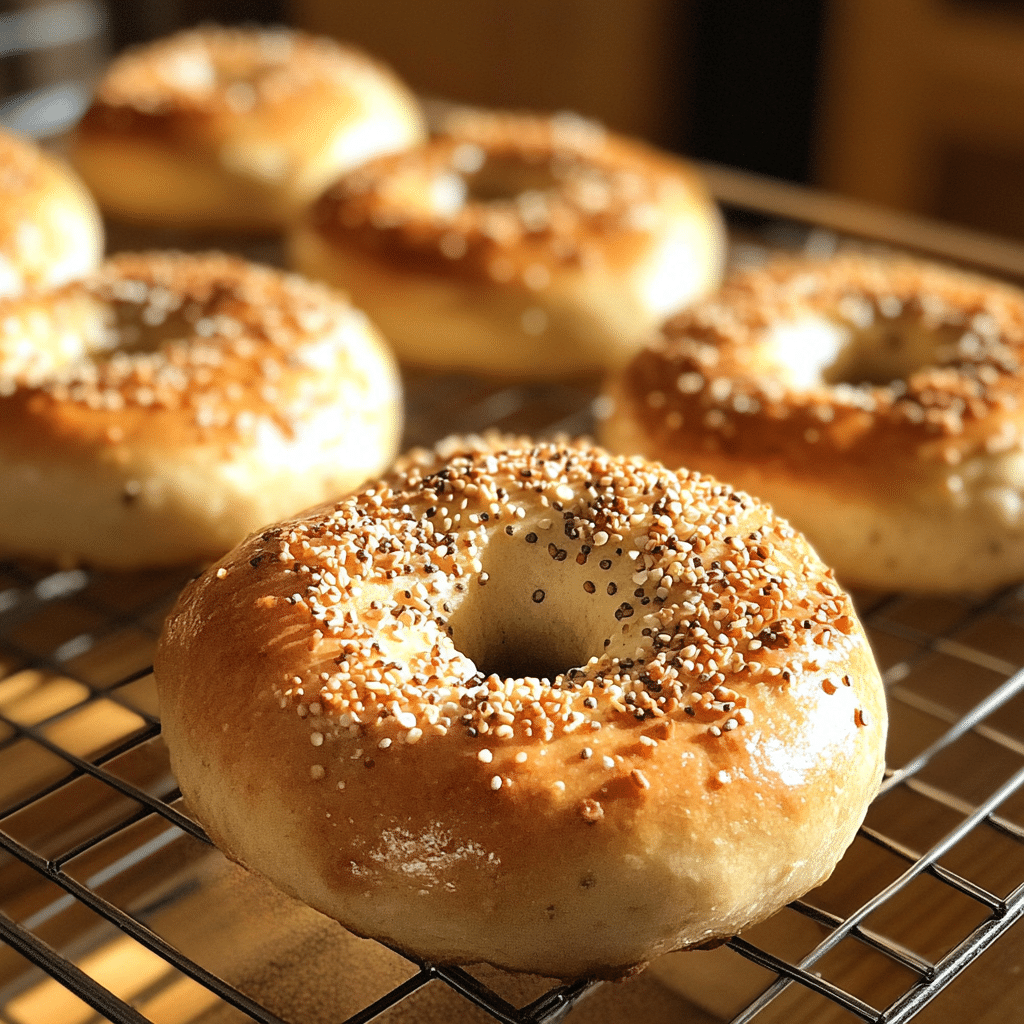
Troubleshooting Common Dough Issues
Why is My Dough Sticky?
Sticky dough is one of the most common issues when making cottage cheese bagels—but don’t panic, it’s totally fixable.
Main reasons for sticky dough:
- Too much moisture from the cottage cheese (especially if it’s not drained or if it’s a full-fat, high-moisture version).
- Using non-blended or chunky cottage cheese, which doesn’t bind as smoothly.
- Humidity in your kitchen can affect flour’s absorbency.
How to fix it:
- Lightly flour your hands and work surface—don’t dump more flour into the bowl.
- Let the dough rest for 5–10 minutes before shaping.
- Blend your cottage cheese next time for a more consistent texture.
- Use a flour scraper or silicone spatula to handle soft dough without sticking.
| Problem | Cause | Quick Fix |
|---|---|---|
| Dough too wet | High-moisture cheese | Drain or blend the cheese |
| Sticks to hands/worktop | Low flour absorption | Flour your hands and surface |
| Spreads too much in oven | Overworked or warm dough | Chill dough before baking |
Sticky dough isn’t a recipe fail—it’s often the secret to fluffier bagels once baked. Just handle it gently and work with, not against, the moisture.
Fixing Texture Problems Without Ruining the Batch
If your finished bagels come out too dense or too crumbly, you may need to adjust ingredient ratios next time.
Dense or gummy?
- You may have overmixed or used flour without enough leavening.
- Try baking them slightly longer or using a coarser flour.
Too crumbly?
- You likely used too little binding agent. Next time, try adding 1 tbsp Greek yogurt or a touch more blended cottage cheese.
Soggy bottom?
- Bake them on a wire rack or use parchment paper for airflow.
- Avoid placing hot bagels directly on a flat surface—this traps steam.
Looking for inspiration? Try the Natural Zepbound Recipes for Weight Loss—they’re packed with smart ingredient tips that apply here too.
Mastering the dough means smoother baking and fluffier results every single time.
Are Cottage Cheese Bagels Healthy?
Macronutrient Breakdown & Protein Content
Yes, cottage cheese bagels are healthy, especially when compared to traditional store-bought bagels loaded with refined carbs, sugar, and preservatives. The addition of cottage cheese increases the protein and reduces the fat and carb content—ideal for those looking to eat clean or support weight loss.
Here’s a typical nutrition breakdown for one medium cottage cheese bagels (about 100g):
| Nutrient | Amount (approx.) |
|---|---|
| Calories | 190 |
| Protein | 14–16g |
| Carbohydrates | 18–22g |
| Fat | 4–6g |
| Fiber | 1–2g |
| Sugar | <2g |
That protein count alone makes them ideal for breakfast, post-workout snacks, or even a light dinner. Cottage cheese is high in casein protein, which helps repair muscles and provides a slow, sustained source of energy.
If you opt for a whole-grain or gluten-free flour blend, you’ll also benefit from more fiber, which helps with digestion and fullness.
Comparison to Store-Bought Bagels
Let’s compare your homemade cottage cheese bagels with the average grocery store bagel:
| Type | Calories | Protein | Sugar | Preservatives |
|---|---|---|---|---|
| Cottage Cheese Bagels | ~190 | 14g | <2g | No |
| Store-Bought Plain Bagel | ~290 | 9g | 6g | Yes |
| Flavored Store-Bought Bagel | ~350 | 8g | 10g | Yes |
Health Highlights of Cottage Cheese Bagels:
- High in natural protein
- Lower in sugar and refined carbs
- No additives or preservatives
- Easily made gluten-free or low-carb
- Packed with calcium, B-vitamins, and potassium
Check out the Pink Salt Weight Loss Recipe for another healthy, naturally nourishing recipe that pairs beautifully with these bagels.
If you’re on a keto, low-carb, high-protein, or even a diabetic-friendly diet, these bagels offer the kind of balance that fits right in.
Creative Variations & Toppings for Cottage Cheese Bagels
Sweet Bagel Variants (Cinnamon Raisin, Blueberry)
Who says bagels can’t satisfy your sweet tooth and still be healthy? By adjusting the mix-ins slightly, cottage cheese bagels can easily transform into a sweet morning treat or mid-day snack.
Sweet Flavor Add-in Ideas:
- Cinnamon Raisin: Add 1 tsp cinnamon + 2 tbsp raisins to the dough.
- Blueberry Vanilla: Add ¼ cup fresh or dried blueberries + ½ tsp vanilla extract.
- Banana Nut: Mash ½ banana into the cottage cheese, fold in chopped walnuts.
- Chocolate Chip: Use dark mini chips and a dash of almond extract.
Sweet Toppings:
- Honey drizzle
- Almond butter
- Greek yogurt frosting
- Maple syrup + crushed nuts
Storage Tip: Sweet bagels are best stored in an airtight container in the fridge for up to 4 days. Toast them before serving to bring back that bakery-style bite.
Savory Ideas (Everything Bagel, Garlic & Herb)
Savory variations are where these high-protein bagels really shine. They’re hearty, flavorful, and perfect for breakfast sandwiches, open-faced lunches, or dipping into soups.
Savory Add-ins for the Dough:
- Everything Seasoning: Mix 1 tbsp directly into the dough + sprinkle on top.
- Garlic & Herb: Add ½ tsp garlic powder, chopped parsley, and chives.
- Cheddar Jalapeño: Fold in ¼ cup shredded cheese + diced jalapeño.
- Sun-Dried Tomato & Basil: Adds a bold, Italian twist.
Savory Spreads to Try:
- Avocado mash with lemon and red pepper flakes
- Whipped cream cheese + smoked salmon
- Hummus + sliced cucumbers
- Egg salad or tuna salad
Whether you’re going for something sweet or savory, there’s no wrong way to enjoy cottage cheese bagels. The dough is flexible, the flavors are customizable, and the possibilities are endless.

Storage, Reheating, and Meal Prep Tips
Freezing and Reheating Techniques
One of the best things about cottage cheese bagels is that they’re incredibly freezer-friendly. You can make a big batch on the weekend and have ready-to-go breakfasts or snacks for the entire week (or month!).
Freezing Instructions:
- Let bagels cool completely after baking.
- Individually wrap each bagel securely in plastic wrap or aluminum foil.
- Place them in a freezer-safe zip-top bag. Squeeze out the air.
- Label the bag with the date. Store for up to 3 months.
Reheating from Frozen:
| Method | Time | Notes |
|---|---|---|
| Toaster | 3–5 minutes | Best for texture, especially for savory ones |
| Oven (350°F) | 10–12 minutes | Wrap in foil to keep moisture |
| Microwave (Low) | 30–45 seconds | Use only in a pinch; may soften crust |
Pro Tip: Slice bagels before freezing for faster reheating. You can toast them straight from frozen—no need to thaw.
How to Prep Cottage Cheese Bagels Ahead
Meal prepping with high-protein bagels is a smart move if you’re aiming to eat clean and stay energized during your week. Here’s how:
Weekly Prep Plan:
- Make a double batch on Sunday.
- Flavor half sweet, half savory.
- Refrigerate what you’ll eat within 3–4 days.
- Freeze the rest in portioned bags (2 per bag for grab-and-go use).
- Pair with prepped toppings: hard-boiled eggs, sliced avocado, fruit jam, or hummus.
Storage Tips for Fresh Bagels:
- Store in an airtight container in the fridge.
- Use parchment paper between stacked bagels to prevent sticking.
- Avoid leaving them at room temperature longer than 24 hours—they’re preservative-free!
By planning ahead, you’ll always have a healthy, delicious, protein-packed option waiting for you.
Looking for inspiration? Try our Natural Zepbound Recipes to pair with your cottage cheese bagels and complete a wholesome weekly meal plan.
Pairing Ideas – What Goes Well with Cottage Cheese Bagels?
Best Spreads and Fillings
Whether you prefer sweet, savory, or somewhere in between, cottage cheese bagels are endlessly customizable. Their soft, protein-rich base makes the perfect canvas for nearly any topping or spread.
Savory Pairings:
- Avocado Smash + Egg: Rich in fiber and healthy fats—perfect for breakfast.
- Smoked Salmon + Cream Cheese: A classic combo that’s both indulgent and protein-packed.
- Tuna Salad or Egg Salad: a satisfying, meal-prep-friendly option for a hearty lunch.
- Hummus + Sliced Cucumbers: Plant-based and refreshing.
Sweet Pairings:
- Almond Butter + Banana Slices: Great pre- or post-workout snack.
- Greek Yogurt + Berries + Honey: A protein bomb with antioxidants.
- Maple Cinnamon Butter: Adds a warm, cozy touch to morning bagels.
- Nutella + Strawberries (for cheat days): Indulgent yet balanced.
Healthy Breakfast and Lunch Combos
These pairings elevate your bagel game by transforming it into a well-rounded meal:
| Meal Time | Bagel Flavor | Pair With | Nutrition Benefit |
|---|---|---|---|
| Breakfast | Cinnamon Raisin | Greek yogurt + honey | Protein + gut health |
| Snack | Everything Bagel | Avocado mash + chili flakes | Healthy fats + fiber |
| Lunch | Garlic Herb | Grilled chicken breast + spinach | High protein + iron |
| Post-Workout | Plain Bagel | Scrambled eggs + hummus | Recovery + clean energy |
These combos will keep you full, energized, and satisfied without the crash.
Cottage cheese bagels aren’t just a trend—they’re a full-blown lifestyle choice. When paired right, they become the base of high-protein breakfasts, balanced lunches, or even guilt-free snacks.
Conclusion
Cottage cheese bagels are more than just a trend—they’re a delicious, nutritious, and incredibly easy way to bring more protein into your diet without sacrificing taste or texture. Whether you’re going for a gluten-free option, a sweet variation, or just a reliable meal prep solution, these bagels deliver.
From breakfast spreads to sandwich-style lunches, the possibilities are endless. Plus, with only a few ingredients and no yeast required, they fit easily into even the busiest schedules.
Check out our Pink Salt Weight Loss Recipe for another simple, nourishing recipe you can add to your routine.
For more recipes Follow me in our Social media
Facebook: https://www.facebook.com/profile.php?id=61573913076847
Pinterest: https://www.pinterest.com/momandgrandmacooks/
Medium: https://medium.com/@momandgrandmacooks
Frequently Asked Questions About Cottage Cheese Bagels
Can I make these gluten-free?
Yes! Cottage cheese bagels can absolutely be made gluten-free. Use a 1:1 gluten-free flour blend that includes xanthan gum, or combine almond and oat flours with a binder like Greek yogurt. The moisture from cottage cheese actually makes it easier to work with gluten-free dough.
Do I need to blend the cottage cheese?
It’s optional but recommended for smoother dough. Blending the cottage cheese gives you a more uniform texture, especially if you’re looking for classic bagel appearance. If you don’t mind a rustic look with tiny curds visible, feel free to skip blending.
Why is my dough sticky?
Sticky dough usually means your cottage cheese had extra moisture or you under-measured the flour. Lightly flour your hands and the surface—avoid overmixing or dumping in more flour. Resting the dough for 5–10 minutes before kneading also helps absorb excess liquid.
Are cottage cheese bagels healthy?
Definitely. These bagels are high in protein, low in sugar, and free from preservatives. They offer a great balance of macros, especially when made with low-fat cottage cheese and whole grain or gluten-free flour. They’re a smart swap for traditional bagels.

